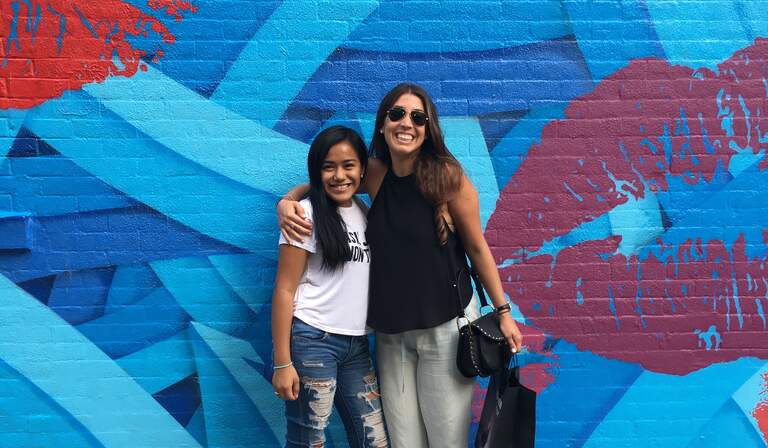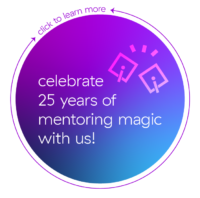In honor of Hispanic Heritage Month, we reached out to mentor Maria Jose Perez for her reflections on being a mentor, the impact mentoring has on the Hispanic community, and how iMentor can support students of Hispanic heritage.
Name: Maria Jose Perez
Occupation: Corporate Services and Real Estate Analyst at Goldman Sachs
Number of years mentoring with iMentor: 8 months
iMentor: Did you have any mentors growing up? If so, in what ways did your mentors help shape your life?
Maria: I did not have any formal mentors growing up but I have been lucky to grow up in a family of five other siblings and amazing parents who have shown us the way. In away, my sisters, parents and extended family have been my mentors throughout my life and have shaped me in so many different ways. Now, as a professional, I have looked for mentors that help me think about my career and professional growth. They provide guidance when I am making big decisions such as changing roles, taking on more responsibility or how to deal with tough situations.
iMentor: Why did you decide to become an iMentor mentor?
Maria: I was looking for an opportunity to serve others and genuinely feel invested in what I was doing. Mentorship provided me with the opportunity to add value to someone’s life, serve and help them in whatever they need while giving me the opportunity to commit to something because I really wanted to, not because I was being asked to do so. Working in Corporate America can sometimes feel pretty meaningless and I was at a point where I needed something with a bigger and greater purpose.
iMentor: How has being a mentor impacted your life?
Maria: It has been great so far, but I am really at the start of this journey. My mentee, Grethel, is a wonderful young girl with so much to give and so much to learn from. In the times that we live in, it is very easy to be selfish and not even notice it. Being a mentor has reminded me that being selfless is important and that helping others can provide so much more happiness and joy than what society may consider “success”. Being able to see how the small things matter, just showing that you care, makes a difference and that has been a great lesson for me. Keep it simple, genuine and truthful. And that applies to anything in life.
iMentor: What advice would you give other adults who may be hesitant to become a mentor?
Maria: I would encourage them to think about why they are hesitant to become a mentor. Is it fear? Is it not being able to meet the requirements? Why would they consider it and be hesitant? Whatever it is, I would let them know that this is so much easier than what it seems as long as the motivation to do it comes from a truthful, genuine place. Giving, caring, and helping will always make sense, no matter what the circumstances are.
iMentor: Most of the students iMentor serves are Hispanic and black. How important is mentoring in the lives of students of color?
Maria: I wouldn’t say it is just students of color but any student who does not have the appropriate support to trust and believe in themselves. In the case of Hispanic and black students in the US, I would say it is important that they feel that they can make it and that they can achieve their goals just as anybody else. I can understand how being in this country, coming from a different race or culture, may be intimidating. So having someone that you look up to tell you that you can do it as well, is a valuable thing. The power to do great things comes from within, independently of where you came from.
iMentor: How has your relationship with your mentee impacted your mentee’s life? Have you witnessed any changes in your mentee’s outlook on high school and college completion?
Maria: I only joined the program eight months ago so I am not sure there have been huge changes in terms of seeing development in my mentee. But I have noticed a big difference in her level of comfort and trust in me. This is a key element for me to be able to help her get into college. I am really looking forward to seeing Grethel grow and develop personally, academically, and professionally.
I have also seen how she has used some of the advice that I have given her in terms of learning how to navigate NYC, understanding the subway, etc. When we met for the first time, she had just arrived from Costa Rica for the first time and didn’t even know her neighborhood very well. I could tell that NYC intimidated her a bit. Last weekend we spent a day together and I was surprised with how comfortable she was walking around by herself and knowing where to go, what subway to take, etc. She is definitely better at it than me now.
iMentor: How can iMentor better support students of Hispanic heritage on their road to college and through college persistence?
Maria: I think iMentor does a great job at this already just by connecting someone that wants to help with someone that needs it. Perhaps a way to better support students would be by giving mentors more resources that they can leverage in order to enhance the mentees' experience. Some mentors are naturally good at developing a relationship with their mentees and helping them. However, there are others that may need ideas as to how to get creative and engage better with their mentees.

